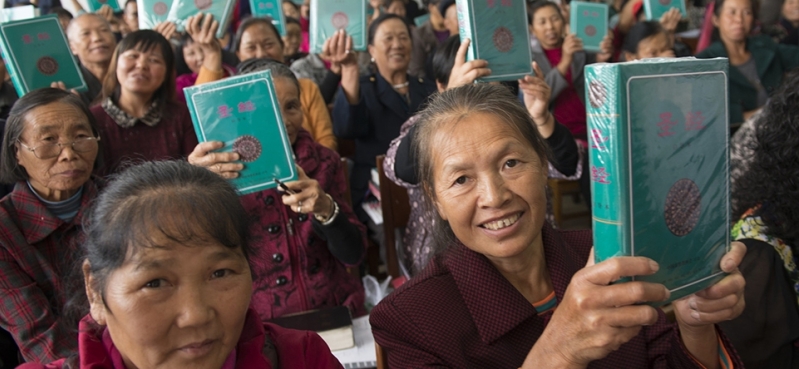
A billion humans, or one in seven people on Earth, do not have the full Bible available in their native language. But there is an organizational network of Christians whose mission it is to change that statistic by 2025 through the work of the United Bible Societies.
The largest Bible-centered meeting of the decade recently united 450 worldwide Christian leaders who gathered in Philadelphia, Pa., for the United Bible Societies' World Assembly that occurs once every six years. American Bible Society members hosted the 2016 event during the organization's 200th year.
This meeting included representatives from 147 Bible societies working in more than 200 countries and territories.
"We saw the Holy Spirit at work at this Assembly in so many ways, especially through patterns of praise, unity, generosity and urgency toward the singular mission and shared vision of the Bible," said Drew Hood, American Bible Society's managing director of communications.
Attendees at the World Assembly focused on the two major topics of governance and vision, Hood said. "We discussed how efficiently and effectively we're all operating and working toward our major priorities."
The World Assembly followed the American Bible Society's bicentennial celebration gala at the Philadelphia Art Museum held May 12. The gala launched the World Assembly, a series of meetings and events during which leaders in the Bible cause developed a blueprint for the future of Bible ministry. The World Assembly concluded May 18. Global Bible ministry leaders attended the Assembly dressed in traditional attire from their home countries, making the event a true visual representation of the diversity of the attendees as well as the cultures and people they serve.
Roy Peterson, president and CEO of American Bible Society said while it is an exciting time for the American Bible Society, more importantly, it is an exciting time for the Bible cause. "New technology provides unparalleled opportunities for translation and distribution of God's Word."
Hood said 1,800 people groups, representing 163 million people, do not have a single word of the Bible available in their native language. "They live in some of the most remote, hostile places on the planet. And these are living, not dying, languages."
He said by various Bible translation entities agreeing to form new partnerships, the belief is that they will make collective strides in the next 10 years so that at least some portions of scripture will be translated and distributed to the 1,800 people groups still waiting.
Bible translation used to happen by individuals working 20 to 40 years to complete one, said Hood. "Today, Bible translation is much more community-driven and based on local needs. Translation now is more agile and rapid, especially due to new technologies."
He said Bible Societies' teams train local church leaders how to translate. "Those local leaders then can translate and test scripture or passages to ensure everyone can understand it."
Hood said the Societies' resources to local leaders also sometimes include generators, wireless hot spots and bicycles, basically any item needed to accelerate and preserve the translation progress.
"This year's discussions primarily focused on three topics: how to get Bibles to the next generation, digital innovation and increasing global partnerships," said Hood.
"At the gathering, there were so many examples of various entities sacrificing their own identities and leaving their logos at the door, so to speak, all in an effort to push God's mission forward. Many outcomes were decided within the community. Groups wanted their voices heard, but they definitely came together for decisions in the spirit of a deep, abiding unity for God's Word going around the world."
Although each region of the world has unique contexts in which to work for Biblical translations, Hood said it boils down to creating winning objectives that meet the needs of Christian "hands, heads and hearts."
He said some communities value and use the launch of Bible translations while facing local persecution, trauma, poverty, illiteracy - all real barriers that must be overcome for scripture engagement. "Bible Societies' representatives focus on customized solutions so more people can walk in the healing presence of Christ," he added.
Hood said the ripple effects of Bible translations routinely uplift individuals, families and communities with new hope and true life transformations. "We hear from so many people that their lives were shambles before they had a Bible. They relay that Bibles make Jesus come alive and they then become a different person."
He said Biblical translations deliver the power of scripture in ways that "God is longing for in His kingdom."
Hood said Assembly attendees projected tremendous humility and that they obviously wanted the benefits of collective cooperation to "go farther, faster." The overall blueprint is expected to be finalized in the near future.
The weeklong World Assembly featured internationally recognized speakers, such as His Grace Bishop Angaelos, general bishop of the Coptic Orthodox Church in the United Kingdom and Kirk Franklin, executive director of Wycliffe Global Alliance.
United Bible Societies is a global network of Bible societies that collectively are the world's biggest translator, publisher and distributor of the Bible. Bible Societies also are active in causes, such as HIV/AIDS prevention, trauma healing and literacy. Bible Societies work with all Christian Churches and many international non-governmental organizations.
Founded in 1816, American Bible Society representatives seek to make the Bible available to every person in a language and format each can understand and afford. One of the oldest U.S. nonprofit organizations, today's American Bible Society provides resources across a variety of platforms enabling first-time readers and seasoned theologians alike to engage with the best-selling book of all time.







